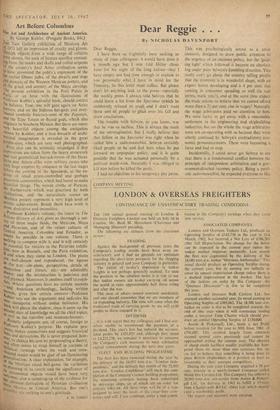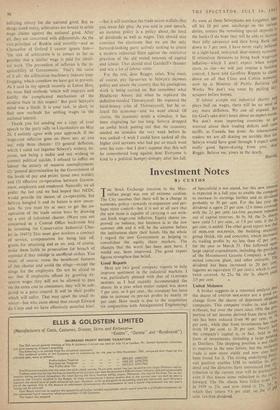Dear Reggie . • •
R y NICHOLAS DAVENPORT
Dear Reggie,
I have been so frightfully busy sacking so many of your colleagues—1 would have done it a month ago but i was told Hitler • choSe June for his night of the long knives—that I have simply not had time enough to explain to you personally what .1 have in mind for the Treasury. So this letter must suffice. But please don't let anything leak to the press—especially the weekly press. I always told Selwyn that he could learn a lot from the Spectator (which he stubbornly refused to read) and I don't want those sort of people to gloat over his fall and draw conclusions.
The trouble with Selwyn, as you know, was that he was so tactless. This is always the mark of the unimaginative, but 1 really believe that that fellow in the Spectator was right when he called him a sado-masochist. Selwyn certainly liked people to be and feel hurt w hen he put forward an unpopular policy, and it is quite possible that he was actuated personally by a political death-wish. Naturally 1 was obliged to kill him before he killed the party.
I had no objection to his temporary pay pause. This was psychologically sound as a crisis measure, designed to draw public attention to the urgency of an incomes policy, but the 'guid- ing light' which followed it became an absolute fog under poor Selwyn's fumbling direction. You really can't go about the country telling people that the economy is in wonderful shape, with an export boom developing and a 4 per cent. rise coming in ConSumer spending as well (in real terms, mark you!), and at the same time expect the trade unions to believe that we cannot afford more than a 2 per cent. rise in wages! Naturally the wage arbitrators paid no attention to him. We were lucky to get away with a reasonable -settlement in the engineering and shipbuilding industries, but on the whole the wage arbitrators were not co-operating with us because they were utterly confused by Selwyn's contradictory eco- nomic pronouncements. These were becoming a farce and had to stop.
Incidentally, I could never get Selwyn to see that there is a fundamental conflict between the principle of independent arbitration and a gov- ernment-directed incomes policy. Being a patri- otic sado-masochist, he expected everyone to like
inflicting misery for the national good. But as things stand today, arbitrators are bound to settle wage claims against the national good. After all, they are concerned with differentials. As the vice-principal of Ruskin said recently—and as
Chancellor of Oxford I cannot ignore him—
'the task of arbitrators is to ensure as far as possible that a similar wage is paid for identi- cL1 work. The prevention of inflation is the re- sponsibility of Government.' That's the curse of it all: the arbitration machinery induces leap- frogging, which somehow we have got to prevent. As I said in my speech recently at Luton Hoo, we must find methods 'which will improve and fortify the complicated mechanism of the modern State in this respect.' But poor Selwyn's mind was a blank. It is your task, in short, to find new methods for settling wages in the national interest.
Thank you for sending me a copy of your speech to the party rally in Lincolnshire on May 26. I entirely agree with your approach. If the wage-cost inflation goes on there are, as you say, only three choices: (I) general deflation, which I ruled out (against Selwyn's wishes), be- cause, not being a sadist and not wishing to commit political suicide, I refused to inflict on labour the .misery of massive unemployment; (2) `general determination by the Government of the levels of pay and prices' (your own words); and (3) effective co-operation between Govern- ment, employers and employed. Naturally we all prefer the last and we had hoped that NEDC would provide the means of co-operation, but Selwyn bungled it and its future is now uncer- tain. So you must try at once to get the co- ., operation of the trade union boys by drawing up a sort of industrial charter. (Were you not concerned as a Central Office backroom boy in inventing the Conservative Industrial Char- ter in 1947?) This must give workers a contract of service, compensation for being laid off, grants for retraining and so on, and, of course, make them liable to prosecution for breach of co,ntract if they indulge in unofficial strikes. You must, of course, stress the beneficent features of this charter and avoid the stings—except the stings for the employers. Do not be afraid to say that if employers offend by granting ex- cessive wages they will not be allowed to pass on the extra cost to consumers; they will be sub- jected to a price control. It will be their profits which will suffer. That may upset the small in- vestor—but who cares about that except Edward du Cann and •we have effectively muzzled him! —but it will convince the trade union wallahs that you mean fair play. As you said in your speech,
an incomes policy is a policy about, the level of dividends as well as wages. This should also convince the electorate that we are the only forward-looking party actively seeking to create a modern industrial State against the restrictive practices of the old vested interests of capital and labour. That should steal Gaitskell's thunder and win a lot of labour votes.
For the rest, dear Reggie, relax. You must, of course, pay lip-service to Selwyn's incomes policy and assure the country that his courageous work is being carried on. But remember what Heathcoat Amory did when he replaced the deflation-minded Thorneycroft. He repeated the hard-money cries of Thorneycroft, but he re- laxed the economy—and we went ahead. Of course, the economy needs a stimulus; it has been stagnating far too long. Selwyn dropped an awful brick putting out that the economy needed no stimulus the very week before he was sacked—I wish I could have sacked all the higher civil servants who had put so much wool over his eyes—but I don't suppose that this will be remembered long against him. Everyone is kind to a political humpty-dumpty after his fall. As soon as these Selwynisms are forgotten, take off his 10 per cent. surcharge on the various duties, restore the remaining special deposits to the banks (I do hope they will be able to increase their jolly advances) and then bring Bank rate down to 3 per cent. I have never really believed in a tight-laced, restricted, dear-money econoinY. If relaxation threatens to bring back wage-cost inflation—which I don't expect when output starts to rise—we will just impose a building' control. I have told Geoffrey Rippon to clamp' down on all that Clore and Cotton nonsense, he is Minister of Public Building antiWorks. We don't win votes by putting sky'scrapers before homes, If labour accepts our industrial charter and plays ball on wages, there will be no need of any more deflation. We can all expand. But for God's sake don't boast about an export boonv We don't want importing countries to get worried about their trading deficits and raise tariffs, as Canada has done. As international traders we are all skating on terribly thin lee' Selwyn would have gone through. I expect smile really good figure-skating from you, dear Reggie. Believe me, yours to the death, Harold'



































 Previous page
Previous page